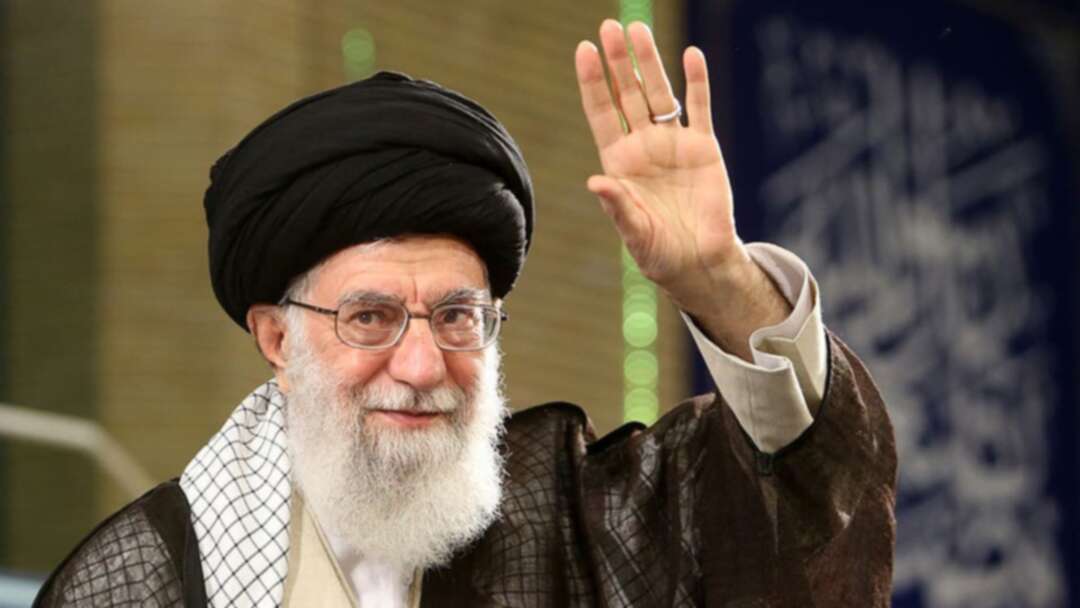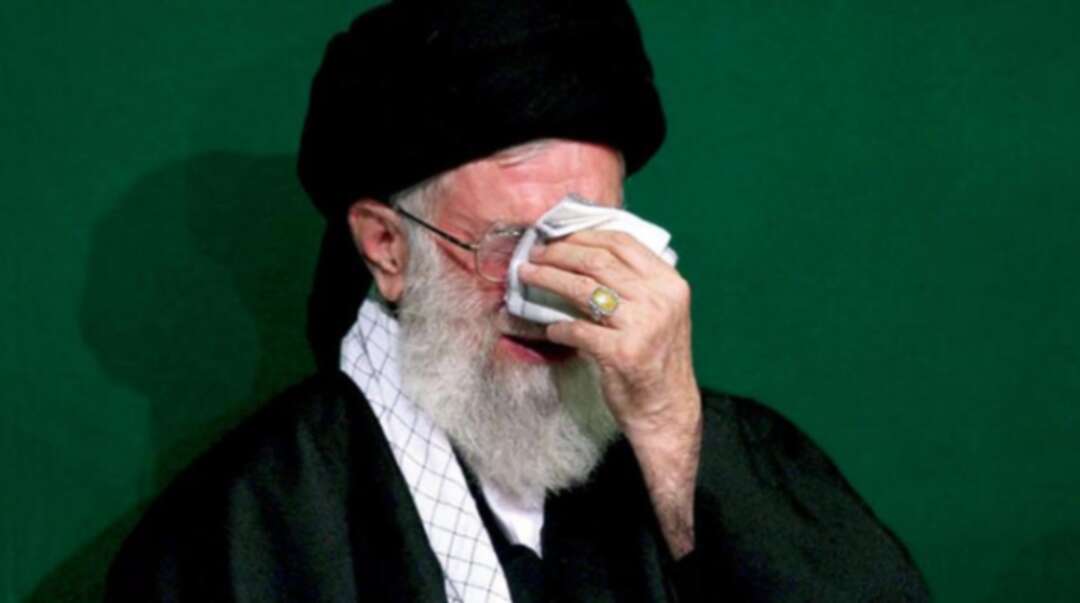-
Khamenei inevitably admits to falling into the vortex of crises

According to all the observers on the scene, this year’s anniversary of the Iranian Revolution on February 11 was the most desolate ceremony in the last 43 years. So much so that even the regime's televisions that broadcast scenes of rallies and so-called demonstrations had to refrain from taking wide-angle shots and resorted to only taking narrow-angle shots so that the actual number of people on the scene could not be seen.
The truth is that for several years now, the majority of Iranians have not attended the ceremony, opposing Khamenei's dictatorship, and only government affiliates have been attending. In previous years, when there was no pandemic and the schools were open, the government forced school students to attend the event, and many government employees were made to participate in the event for fear of being fired or losing benefits. This way the government was able to hide people’s dissatisfaction of the system and government orchestrated demonstrations to certain extent, but this year none of this was possible, and as a result, marches and rallies were held in very small numbers in all cities.
But Khamenei, in a speech he gave almost a week later on February 17, said in astonishment and with Goebbels-like lies:
"This year 's ceremony was strange and the crowd was bigger than in previous years. Some said the population doubled and some said 50 percent more than last year. "It was the same in all cities." He further claimed that "in the years after the revolution, we are ahead of the rest of the world in terms of scientific progress. "This is not my judgment. It is the judgment of international centers, stating that the speed and rate of our progress are many times greater than the rest of the world. Now some have said 10 times, some have said 13 times the world average."
Hearing these claims in a situation where Iran is drowning in various crises was not only very surprising but also offensive to the people because inflation has reached over 50% and according to government officials, more than 60-70% of the population has fallen below the poverty line. About 20 million people (about a quarter of Iran's population) have been driven to the outskirts of big cities, unable to pay the staggering costs of housing and livelihoods in cities, and are living in miserable conditions.
"It was really an admirable move," Khamenei said. “These problems that surround the people, the pandemic on the one hand, the problems of livelihood on the other hand, the sludge dispersal of foreigners on the one hand, the help of some internal elements to the same sludge dispersal on the one hand, the siege of all obstacles and problems of the nation. In spite of all these problems, the nation was able to have this massive march."
By “sludge dispersion,” Khamenei meant the events that took place in Iran in the last 2-3 weeks.
First, the resistance forces infiltrated 25 radio and television transmitters in different cities in the middle of the most important programs of the day and managed to interrupt the programs and broadcast the slogan of “Down with Khamenei” and “Viva Rajavi” (the leader of PMOI) for 10 seconds by showing the leaders of the PMOI on the TV screen.
Then, by hacking the speakers of Mashhad Grand Bazaar (in north eastern Iran) and one of the main squares of Karaj (northwest of Tehran), they chanted slogans of down with Khamenei and curses to Khomeini and greetings to the Mojahedin for a longer period. These activities were welcomed by people and made them happy.
Following these events, a tape of secret talks between Mohammad Jafari, the former commander of the Revolutionary Guards, and his deputy was leaked, in which they spoke of $3 billion embezzlement by Qalibaf (the current speaker of parliament) and Qassem Soleimani (the commander of Qods terrorist corps, who was terminated by the United States).
Khamenei, who has long sought to obtain an atomic bomb to ensure the survival of his regime, pursued the plan secretly without informing the International Atomic Energy Agency until its revelation by the National Council of Resistance in 2002. "The world is becoming more and more dependent on nuclear energy, and sooner or later we will be in dire need of peaceful nuclear energy," he said. "Today, if we do not plan; today, if we do not take action, tomorrow will be too late."
He blamed the United States for the sanctions that have crippled the nation's economy and turned Iran into an isolated country, saying: "Look at the cruel take of the enemy from the issue of our nuclear energy: sanctions because of the nuclear energy that they know is peaceful. Let them claim that we are this far from producing the bomb. This is nonsense. They know that we are not looking for a nuclear weapon. We are looking for a peaceful use of nuclear energy."
It is clear that he would never have secretly pursued this program if he had only sought the peaceful utilization of nuclear energy. By the same token, he is not yet willing to cooperate transparently and give all his information in this regard to the IAEA.
Khamenei, fully aware of the Iranian people's demands which are:
- to abandon the nuclear bomb-making program and
- interact with the world
- and not to interfere in the affairs of other countries,
- as well as to oppose the dictatorship of Velayat-e-Faqih,
While acknowledging these demands, he justifies the current situation by saying: “Some people say the regime has moved away from the goals of the revolution. I do not accept this statement. Those who insist on surrendering to the United States cannot adhere to this revolution."

Citing an example from Khomeini's rule, he said, "The Imam (meaning Khomeini) created a means for the nation's empowerment from the Iran-Iraq war… He used the war as a means to strengthen and perpetuate the revolution and to turn this threat into an opportunity.
He theorized his interventions in other countries in the same way that "the goal of the revolution was to finally reach the new Islamic civilization and the great Islamic civilization ...... In order to finally reach the new Islamic civilization, it is necessary to help the resistance centers. Those who are in the fields." He clearly meant the centers of resistance in Iraq, Syria, Lebanon, Yemen, and Palestine by the terrorist forces of the Quds Corps or the militias affiliated with his regime, such as Hezbollah, the Houthis, the Katayeb and the Asaeb in Iraq, and the Fatimiyouns, the Zainabiyouns, and so on ...
Regarding the desolation of the march on the anniversary of the revolution and people’s lack of participation he said:
"Today, just see where the enemy is moving. As I see the situation, the enemy is targeting the nation, targeting public opinion, targeting the minds of the youth… Currently, there are two means, one is economic assault to put pressure on people and separate them from the Islamic system, and one is to spread sludge."
Then, to encourage the Revolutionary Guards commanders who were frightened by the disclosure of the audiotape, he added: "They slander those who influence the progress of the revolution. At the same time, they insult the great martyr Qassem Soleimani, and if they did not fear the anger of people and their reaction, they would also insult the Imam (meaning Khomeini)."
Khamenei's words, however, clearly indicate his concern about the opposition of the majority of Iranians, who, fearless of arrests, imprisonment, and even execution by his repressive forces, continue to resist and openly declare their opposition to his regime as they boycotted the presidential election extensively. On the other hand, he has noticed the infiltrating influence in all the pillars of his system. In particular, the radio and television system, which is one of the most secure organs of his regime, and its infiltration sent a great shock to Khamenei and all the mullahs and commanders of the Revolutionary Guards. All these signs indicate that 2022 will be a crucial year for the Khamenei regime, and according to many experts, the ship of the Velayat-e-Faqih regime is going down and no one can save it from sinking.
BY: Cyrus Yaqubi
You May Also Like
Popular Posts
Caricature
BENEFIT Sponsors BuildHer...
- April 23, 2025
BENEFIT, the Kingdom’s innovator and leading company in Fintech and electronic financial transactions service, has sponsored the BuildHer CityHack 2025 Hackathon, a two-day event spearheaded by the College of Engineering and Technology at the Royal University for Women (RUW).
Aimed at secondary school students, the event brought together a distinguished group of academic professionals and technology experts to mentor and inspire young participants.
More than 100 high school students from across the Kingdom of Bahrain took part in the hackathon, which featured an intensive programme of training workshops and hands-on sessions. These activities were tailored to enhance participants’ critical thinking, collaborative problem-solving, and team-building capabilities, while also encouraging the development of practical and sustainable solutions to contemporary challenges using modern technological tools.
BENEFIT’s Chief Executive Mr. Abdulwahed AlJanahi, commented: “Our support for this educational hackathon reflects our long-term strategic vision to nurture the talents of emerging national youth and empower the next generation of accomplished female leaders in technology. By fostering creativity and innovation, we aim to contribute meaningfully to Bahrain’s comprehensive development goals and align with the aspirations outlined in the Kingdom’s Vision 2030—an ambition in which BENEFIT plays a central role.”
Professor Riyadh Yousif Hamzah, President of the Royal University for Women, commented: “This initiative reflects our commitment to advancing women in STEM fields. We're cultivating a generation of creative, solution-driven female leaders who will drive national development. Our partnership with BENEFIT exemplifies the powerful synergy between academia and private sector in supporting educational innovation.”
Hanan Abdulla Hasan, Senior Manager, PR & Communication at BENEFIT, said: “We are honoured to collaborate with RUW in supporting this remarkable technology-focused event. It highlights our commitment to social responsibility, and our ongoing efforts to enhance the digital and innovation capabilities of young Bahraini women and foster their ability to harness technological tools in the service of a smarter, more sustainable future.”
For his part, Dr. Humam ElAgha, Acting Dean of the College of Engineering and Technology at the University, said: “BuildHer CityHack 2025 embodies our hands-on approach to education. By tackling real-world problems through creative thinking and sustainable solutions, we're preparing women to thrive in the knowledge economy – a cornerstone of the University's vision.”
opinion
Report
ads
Newsletter
Subscribe to our mailing list to get the new updates!






















